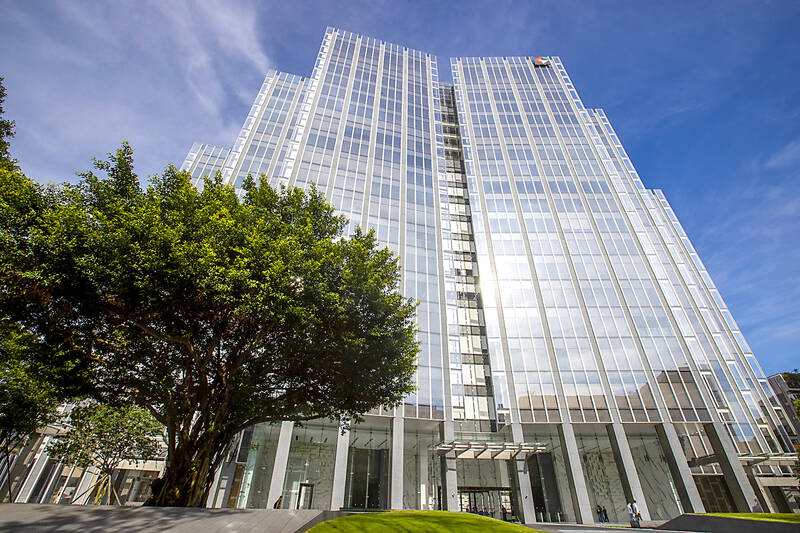Taiwan’s 14 financial holding companies last month reported a 40.54 percent spike in net income to NT$66.5 billion (US$2.09 billion) as life insurance subsidiaries raked in hefty cash dividends and benefitted from asset valuation increases linked to a weak local currency.
Life insurer-focused conglomerates reported combined profits of NT$35.05 billion for last month, outperforming bank-oriented conglomerates (NT$25.0 billion) and securities house-reliant groups (NT$6.69 billion), financial statements showed.
Fubon Financial Holding Co (富邦金控) remained the most profitable with net income of NT$12.53 billion last month and cumulative profit of NT$55.45 billion in the first seven months of this year, it said.

Photo courtesy of China Development Financial Holding Corp
That translated into earnings per share (EPS) of NT$4.19 after main subsidiary Fubon Life Insurance Co (富邦人壽) received ample cash dividends and its US dollar-based assets gained value against the local currency, it said.
Non-life insurance arm Fubon Insurance Co (富邦產險) emerged from losses linked to COVID-19 policies, it said.
Fubon Financial Holding’s profit so far this year has already topped its result for the whole of last year, it said.
CATHAY
Cathay Financial Holding Co (國泰金控), the largest financial holding company in Taiwan in terms of assets, reported record net income of NT16.08 billion for last month, boosting profit so far this year to NT$48.98 billion, or EPS of NT$3.06, it added.
Cathay Financial Holding attributed its strong showing to NT$4 billion of cash dividends and foreign exchange gains linked to a soft New Taiwan dollar.
Its banking arm, Cathay United Bank (國泰世華銀行), had a double-digit percentage growth in interest income, while Cathay Century Insurance Co (國泰產險) reported NT$270 million in profit after previously reporting losses linked to COVID-19 claims, the group said.
CTBC
Bank-focused CTBC Financial Holding Co (中信金控) reported NT$7.61 billion in net income for last month on the back of increases in loan and interest income.
Cumulative profit in the first seven months totaled NT$36.43 billion, or EPS of NT$1.87, making it the third-most profitable of the nation’s 14 financial holding companies.
Mega Financial Holding Co (兆豐金控) was the most profitable state-run financial conglomerate with net income of NT$3.32 billion last month and cumulative profit of NT$22.09 billion in the first seven months, or an EPS of NT$1.58, it said.
Yuanta Financial Holding Co (元大金控), which owns the biggest securities house in Taiwan, posted NT$4.13 billion in net income for last month and profit of NT$19.1 billion in the first seven months, or EPS of NT$1.53.

Taiwan Semiconductor Manufacturing Co (TSMC, 台積電) yesterday said that its investment plan in Arizona is going according to schedule, following a local media report claiming that the company is planning to break ground on its third wafer fab in the US in June. In a statement, TSMC said it does not comment on market speculation, but that its investments in Arizona are proceeding well. TSMC is investing more than US$65 billion in Arizona to build three advanced wafer fabs. The first one has started production using the 4-nanometer (nm) process, while the second one would start mass production using the

‘SILVER LINING’: Although the news caused TSMC to fall on the local market, an analyst said that as tariffs are not set to go into effect until April, there is still time for negotiations US President Donald Trump on Tuesday said that he would likely impose tariffs on semiconductor, automobile and pharmaceutical imports of about 25 percent, with an announcement coming as soon as April 2 in a move that would represent a dramatic widening of the US leader’s trade war. “I probably will tell you that on April 2, but it’ll be in the neighborhood of 25 percent,” Trump told reporters at his Mar-a-Lago club when asked about his plan for auto tariffs. Asked about similar levies on pharmaceutical drugs and semiconductors, the president said that “it’ll be 25 percent and higher, and it’ll

When an apartment comes up for rent in Germany’s big cities, hundreds of prospective tenants often queue down the street to view it, but the acute shortage of affordable housing is getting scant attention ahead of today’s snap general election. “Housing is one of the main problems for people, but nobody talks about it, nobody takes it seriously,” said Andreas Ibel, president of Build Europe, an association representing housing developers. Migration and the sluggish economy top the list of voters’ concerns, but analysts say housing policy fails to break through as returns on investment take time to register, making the

CHIP BOOM: Revenue for the semiconductor industry is set to reach US$1 trillion by 2032, opening up opportunities for the chip pacakging and testing company, it said ASE Technology Holding Co (日月光投控), the world’s largest provider of outsourced semiconductor assembly and test (OSAT) services, yesterday launched a new advanced manufacturing facility in Penang, Malaysia, aiming to meet growing demand for emerging technologies such as generative artificial intelligence (AI) applications. The US$300 million facility is a critical step in expanding ASE’s global footprint, offering an alternative for customers from the US, Europe, Japan, South Korea and China to assemble and test chips outside of Taiwan amid efforts to diversify supply chains. The plant, the company’s fifth in Malaysia, is part of a strategic expansion plan that would more than triple